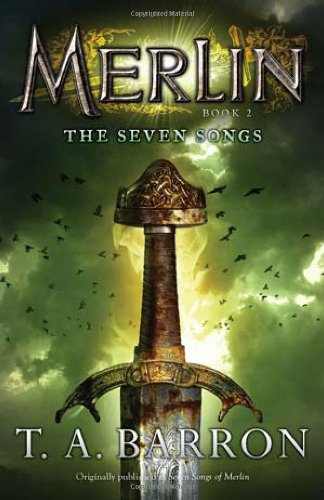
![]() The Seven Songs by T.A. Barron
The Seven Songs by T.A. Barron
“Pursue the Seven Songs in Turn; the Parts Beget the Whole…”
The second book in T.A. Barron’s MERLIN SAGA (preceded by The Lost Years and followed by The Raging Fires) continues young Merlin’s journey toward the powerful wizard of legend. Having noticed that there was very little literature that dealt with Merlin in his formative years, Barron set about writing a “prequel” of sorts to Arthurian legend that explored what Merlin was like as a child. In the first book Merlin discovers the identity of his parents and travels to his homeland Fincayra, an island that exists between the mortal and spirit world.
Having found several treasures that have the power to restore life to Fincayra, Merlin begins his next adventure by travelling across the island with the Flowering Harp, bringing the dead landscape back to life with its music. Yet Merlin is distracted from his task by thoughts of his mother. Having abandoned her in Gwynedd (Wales) in order to discover his roots, he now longs for the chance to see her again. Using ill-advised magic to bring her to the island, their happiness is short-lived when she falls under a spell cast by the evil Rhita Gawr. Now Merlin must travail Fincayra in search of the Seven Songs of Wisdom that will grant him enough power to restore her to health.
With only a short span of time in which to complete this mission, Merlin must prove to be a quick student if he’s to save his mother’s life. Helped by his young friend Rhia (who has a secret of her own) as well as characters both old and new, he accumulates wisdom along with his experiences, knowing that a dangerous one-eyed ogre is waiting for him at the completion of his task.
T.A. Barron’s saga had been recommended to me for some time, and as such I can’t help but feel that it was overhyped for me. Although I enjoyed the book throughout, I certainly wasn’t caught by the desperate need to keep turning the pages or any sense of genuine fear that Merlin wouldn’t be able to complete his task. Though the series (so far) is fun and engaging, I certainly wouldn’t rank it anywhere near the likes of Lloyd Alexander‘s THE CHRONICLES OF PRYDAIN or Lucy Boston‘s THE CHILDREN OF GREEN KNOWE books, both of which also combine coming-of-age stories with a fantasy setting.
Merlin himself is a nice enough protagonist, though some of his development doesn’t feel entirely organic. At the beginning of the book he’s seized with newfound hubris, causing him to act in such a way that kick-starts the plot, but one can feel the authorial fiat at work. His fatal flaw springs out of nowhere just so he can grow out of it over the course of the story, learning a nugget of wisdom at each landmark spread throughout Fincayra. Rhia makes for a suitable companion on Merlin’s journey, strong and vulnerable in turn, but the character of Bumbelwy – a jester who can’t tell a joke – is just annoying.
Likewise, some of the idiosyncrasies present in the speech patterns of certain characters get extremely irritating. The Grand Elusa draws out every word she speaks: “Iiiit iiis eeeven possiiible that, ooone daaay, youuu maaay beee wiiise enouuugh tooo caaarry ooone ooof theee Treasuuures aaand nooot destroooy mooore thaaan youuu creaaate.” It’s like that for a whole chapter, and she didn’t speak this way in the previous book (I went back and checked) so I’ve no idea why she’s doing it now. Then there’s Shim the giant, who turns all his adjectives into adverbs: “Is you certainly? Nobody goes there on purposely. You is foolishly! I misses you, and you too, sweetly Rhia. I hopes to makes another crossing with you one daily.” Fincayra: the magical island where everyone has a speech impediment.
I sat up straighter when the book introduces the character of Vivien (nicknamed Nimue), who is of course a familiar figure from Arthurian mythology and a crucial player in Merlin’s future, but her evilness is projected too soon and so obviously that any suspense or ambiguity that might have been raised over her nature/motivation is over before it’s even begun. Excalibur also makes its debut in this instalment, but is introduced with so little fanfare that it’s easy to miss.
I don’t mean to be negative, honestly I don’t. Barron writes well and the stories open up an intriguing window as to what Merlin’s childhood could have been like. No doubt more aspects of the Arthurian mythos will be added as the series goes on, as well as the fruition of seeds that Barron has planted throughout the story pertaining to his own vision of what Merlin will become. But to me at least, the “x factor” is missing. It’s hard to describe what it is exactly (that’s why we call it the “x factor”) I only know that I’m not as invested as I should be. I have the next book The Raging Fires on hand – I’ll give that a try and see if I want to continue further.
Worth noting is that this series has recently been reprinted, and this instalment’s old title is The Seven Songs of Merlin. Rest assured that the text is unaltered, so make sure you don’t double-up on copies.














How did I miss this? Thanks for bringing it to my attention!
I guess that is true, Marion. And when it comes to "You Only Live Twice," I saw the movie TWICE…
I absolutely loved this deep dive into Edwige Fenech's giallo films! Her unique blend of allure and mystery truly captivates.…
You managed to work in your two loves; vintage fiction and films!
Yup, Marion, your memory serves you well! Oh...as regards these three recent Bond reviews of mine, as the old saying…